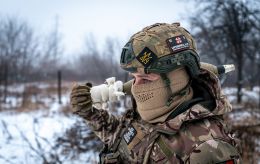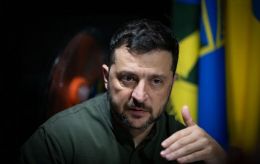Russian army may establish separate drone systems service - ISW
 The Russian army plans to form a drone systems service (Illustrative photo: Getty Images)
The Russian army plans to form a drone systems service (Illustrative photo: Getty Images)
The Russian military is considering the establishment of a dedicated drone systems service as part of efforts by Russia’s Ministry of Defense to catch up with Ukraine’s Drone Forces, which were established in February 2024, reports the Institute for the Study of War (ISW).
During his visit to Kazakhstan on November 28, Russian President Vladimir Putin stated at a press conference that the Russian Ministry of Defense and General Staff are considering the creation of a new drone systems service within the Russian Armed Forces, emphasizing that drones are one of the most important factors in conducting military operations.
A military blogger affiliated with the Russian Airborne Forces (VDV) explained that Russian drone units currently operate unofficially within other military units, simultaneously carrying out their official tasks, such as conducting assault operations or performing medical and sapper functions.
Putin also praised Russia's Minister of Defense, Andrei Belousov, calling him the key figure in the creation of the drone systems service, and referred to him as a "modern Minister of Defense."
Recently, Belousov faced significant backlash from the Russian ultranationalist military blogger community due to his failure to adequately respond to the large number of Russian drone operators and assault operation specialists killed in Ukraine. The Institute for the Study of War (ISW) believes that Putin's mention of Belousov’s involvement could be an attempt to restore his image among Russian ultranationalists and military personnel.
An insider source in the Kremlin claims that the establishment of the new drone systems service may take Belousov anywhere from six months to a year to complete, as it will require several reforms, the expansion of educational programs, the registration of new military specialties, and the integration of volunteer projects into the bureaucratic system of the Russian Ministry of Defense.
In August 2024, Belousov established the Rubikon Center for Prospective Unmanned Technologies based on an undisclosed unmanned aerial unit. The Rubikon Center appears to be an initiative by the Russian Ministry of Defense aimed at creating an educational foundation and developing drones essential for the formation of the new drone systems service.
This center is likely a key component of the broader plan to expand Russia's drone capabilities and integrate them more effectively into the military structure, supporting the creation of a dedicated drone unit within the Russian Armed Forces.
Dysfunction in the Russian army
As noted by the Institute for the Study of War (ISW), Russia's attempts to reorganize informal drone units into centralized, specialized military divisions are already causing significant dysfunction within the Russian military.
A former Russian Storm-Z instructor and military blogger responded to Putin's discussion on the creation of a drone service on November 28. He warned that there is a risk that the Russian Ministry of Defense may attempt to formalize and monopolize the supply of drones for the new drone service, which could undermine the competitive and flexible environment that fosters innovation.
The blogger also pointed out that it remains unclear how the Russian military command will integrate the new drone service with other combat operations. Specifically, there are concerns about how this centralized initiative will impact Russia's operational-tactical reconnaissance-strike complex, which is essential for coordinating and executing military actions. The blogger's comments reflect skepticism about the ability of the Russian military leadership to effectively merge new technologies with existing strategies.
The military blogger added that the new drone service is unlikely to prevent the Russian military command from involving drone operators in assault operations. This is because Russian tank crews, engineers, artillerymen, and communication specialists are already fighting as infantry due to a lack of manpower, despite being part of different military branches.
Earlier, Russian military bloggers claimed that the Russian Ministry of Defense was attempting to form unified drone technical battalions by systematically disbanding informal Russian drone units. These efforts were linked to the creation of the Rubikon Center. The goal of this reorganization seems to be the centralization and formalization of drone operations within the Russian military structure, but concerns remain regarding its effectiveness and integration with existing military operations.
Russian bloggers have previously noted that the Russian military command is increasingly involving drone operators in lethal assault operations. This is done in anticipation that the Russian Ministry of Defense will deprive them of necessary human resources, redistributing them to the unified technical drone battalions under its command.
The bloggers have also criticized the Ministry of Defense's efforts to create separate, specialized drone technical battalions, pointing out the lack of a unified Russian communications system that would allow drone units to coordinate their actions closely with assault units. The absence of such a system could undermine the effectiveness of these specialized units in combat, as seamless coordination between different military branches is essential for success in modern warfare.
Activities of the Ukrainian Armed Forces' drone army
This year, the Ukrainian Armed Forces are set to receive €1.8 billion from the countries participating in the International Drone Coalition. The coalition, formed this year by allied nations to support the Defense Forces with drones, includes nearly 20 countries, led by Latvia and the UK.
President Volodymyr Zelenskyy stated that Ukraine has the potential to produce 4 million drones annually. To date, 1.5 million drones have been contracted.
Meanwhile, the Ukrainian Air Force has reported that the Shahed strike drones, which Russia uses to attack Ukraine daily, can remain airborne for up to 24 hours.

